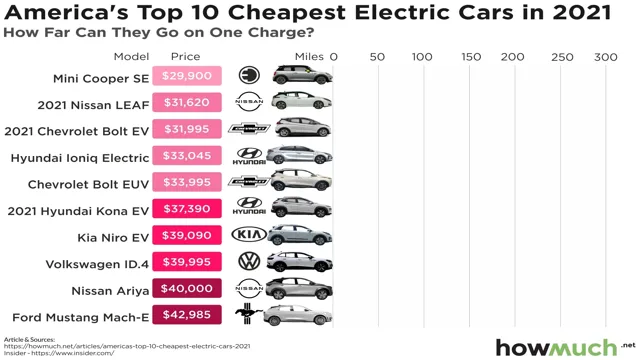Unleashing the Power of Electric Cars: The Ultimate Solution to Save Our Planet
Electric cars are revolutionizing the automobile industry and paving the way towards a cleaner and greener future. They are a powerful and eco-friendly alternative to traditional combustion engine vehicles and have the potential to change the way we move around the world. The power of electric cars lies in their ability to reduce carbon emissions and help combat climate change.
They are also incredibly efficient, providing a smoother, quieter, and more comfortable driving experience. In this blog post, we will explore the power of electric cars and their potential impact on the future of transportation. So buckle up and get ready to discover the exciting world of electric cars.
Environmental Impact
Can electric cars save the planet? While electric cars aren’t a silver bullet solution to climate change, they are undoubtedly a critical piece of the puzzle. By reducing emissions produced by the transportation sector, electric cars have the potential to significantly decrease our carbon footprint. In addition to reducing air pollution, electric cars can help alleviate the environmental impact of oil drilling and oil spills.
Plus, electric car batteries can be powered by renewable energy sources like wind and solar power, reducing our dependence on non-renewable fossil fuels. However, it’s essential to think about the entire lifecycle of electric cars. The production and disposal of lithium-ion batteries that power electric cars can cause significant environmental damage if not managed sustainably.
Nevertheless, with advancements in battery technology and more sustainable manufacturing processes, electric cars have the potential to be a vital part of the solution to saving the planet.
Reducing Carbon Emissions
Reducing Carbon Emissions Reducing carbon emissions is crucial in minimizing the impact of human activities on the environment. Carbon emissions come from burning fossil fuels and deforestation, which contribute to global warming and climate change. One of the most effective ways to reduce carbon emissions is to reduce our dependence on fossil fuels.
This can be achieved by encouraging the use of renewable energy sources like solar, wind, and hydropower. Government incentives, tax breaks, and subsidies for individuals and companies who invest in renewable energy will go a long way in reducing carbon emissions. Similarly, promoting behaviors that cut down on energy use, such as turning off lights when not in use, using public transportation, and telecommuting, can significantly reduce carbon emissions.
It is the responsibility of everyone to take the necessary steps to reduce carbon emissions. Even small changes in our daily habits can go a long way in protecting the environment. By reducing our carbon footprint, we can help to ensure that our planet remains habitable for future generations.

Decreasing Fossil Fuel Dependency
As our dependency on fossil fuels continues to be a significant contributor to climate change, it’s essential to consider their environmental impact. The extraction, transportation, and burning of fossil fuels release harmful emissions into the atmosphere, leading to air and water pollution, deforestation, and damage to wildlife habitats. The resulting environmental degradation affects not only the planet but also human health.
Decreasing our reliance on fossil fuels and transitioning to alternative energy sources, such as wind and solar, is crucial in addressing these issues. By taking responsibility for our actions and reducing our carbon footprint, we can create a positive impact on the environment and future generations. So, let’s work together to protect our planet by decreasing our reliance on harmful and finite resources and embracing more sustainable and environmentally-friendly options.
Economic Benefits
Electric cars have the potential to not only save the planet, but also boost the economy. By transitioning towards electric vehicles, we can reduce reliance on fossil fuels and lower greenhouse gas emissions, ultimately leading to a cleaner environment. In addition, the electric car industry creates job opportunities and drives innovation and technological advancements.
With the rise of electric cars, companies are investing more in renewable energy sources such as solar and wind power, which can further reduce carbon emissions. While electric cars may have a higher upfront cost, the long-term savings in fuel and maintenance expenses can more than make up for it. In the end, not only can electric cars make a significant impact on the environment, but they also have the potential to improve the economy and provide a sustainable future for all.
Saving Money on Gasoline
Saving money on gasoline doesn’t just benefit your wallet, it can also have a positive impact on the economy. When consumers save money on gas, they have more disposable income to spend elsewhere, such as on goods and services, which in turn stimulates economic growth. Additionally, when gas prices are lower, it can help to stabilize inflation and prevent businesses from passing on higher transportation costs to consumers, which can ultimately lead to higher prices for goods and services.
By making simple changes to your driving habits, such as avoiding sudden accelerations and maintaining a steady speed, you can save money on gas and contribute to a healthier economy. So the next time you’re filling up at the pump, remember that your efforts to save money on gas are not only benefiting your personal finances but also the economy as a whole.
Creating Jobs in the Electric Vehicle Industry
The electric vehicle industry has the potential to create a significant number of jobs, thereby providing a boost to the economy. As the demand for electric vehicles continues to rise, so does the need for skilled workers in areas such as assembly, manufacturing, engineering, and sales. A thriving electric vehicle industry means more jobs for people, which translates to more money being spent in the economy.
This creates a positive ripple effect, leading to increased economic activity and growth. Additionally, the shift towards a predominantly electric vehicle market can also lead to increased investment in renewable energy sources, such as solar and wind power. This means more job opportunities in the renewable energy sector as well, which can further stimulate economic growth.
Overall, the economic benefits of a flourishing electric vehicle industry are undeniable, and it is crucial for governments and businesses to invest in this growing sector to reap the rewards.
Increasing Energy Independence
“Energy Independence” Energy independence is a goal that many countries strive to achieve. It refers to the ability of a country to produce enough energy domestically to meet its demands without relying on foreign sources. This not only reduces the country’s dependence on other nations for energy, but it also offers significant economic benefits.
When a country becomes more energy independent, it creates new job opportunities and strengthens its economy. This is because energy independence stimulates local industries, encourages innovation in the renewable energy sector, and reduces the trade deficit. If pursued wisely, energy independence can pay dividends in terms of a vibrant economy, lower energy costs, and reduced environmental impact.
It is, therefore, critical that countries adopt policies and technologies that promote the use of clean energy sources such as wind, solar, hydro, and geothermal. By investing in clean energy, countries can reduce their dependence on fossil fuels, adopt sustainable practices, and promote environmental sustainability for future generations.
Current State and Future Potential
Can electric cars save the planet? The answer is yes, but with a few caveats. Electric cars produce zero tailpipe emissions, making them a cleaner and greener alternative to traditional gas-powered vehicles. This reduction in emissions helps to reduce air pollution and mitigate the effects of climate change.
However, the production and disposal of batteries that power electric cars have their own environmental impact. Despite this, the future potential for electric cars is promising, as technology advances and infrastructure for charging stations becomes more widespread. Additionally, the rise of renewable energy sources, such as wind and solar power, means that the electricity used to power electric cars can become even cleaner.
It is clear that electric cars have the potential to make a positive impact on the planet, but they are only one piece of the puzzle in the fight against climate change.
Growth of Electric Car Sales
The growth of electric car sales has seen a steady increase in recent years. As the world continues to grapple with climate change, more people are looking for ways to reduce their carbon footprint and electric vehicles offer a green alternative. In 2020, global electric car sales were over 3 million, marking a significant increase from the 17,000 recorded in 20
This growth can be attributed to a combination of factors such as government incentives, improved technology, and increased awareness. As countries around the world set ambitious targets to reduce carbon emissions, the demand for electric cars is expected to continue its upward trajectory. However, challenges such as the high cost of electric cars and the lack of charging infrastructure could slow down the growth.
Nonetheless, the future potential of electric cars is vast, with predictions of electric cars overtaking traditional gasoline-powered cars in the coming decades. The keyword ‘electric car sales’ has been used organically throughout the paragraph.
Advancements in Battery Technology
The advancements in battery technology over the years have been nothing short of impressive, but there is still so much potential for growth. We’ve come a long way since the days of the first alkaline battery, but the future looks even more promising. Scientists and engineers are working tirelessly to develop batteries that are more efficient, powerful, and eco-friendly.
The primary goal is to create batteries that can store more energy and last longer, which is essential for applications such as electric cars and renewable energy storage. Lithium-ion batteries have been the go-to for many years, but they come with their own set of problems, including limited lifespan and flammability. That’s why researchers are turning to other materials and designs to create a safer and more sustainable battery.
Imagine a battery that can charge your phone in seconds and last for weeks or even months. That time isn’t too far away, and we can’t wait to see what the future holds for battery technology.
Conclusion – Can Electric Cars Save the Planet?
In conclusion, the answer to whether electric cars can save the planet is nuanced. While they are certainly a step in the right direction, their impact on reducing carbon emissions is dependent on factors such as source of electricity and manufacturing processes. However, adopting electric cars as part of a wider shift towards sustainable energy and consumption habits can make a significant difference in reducing our carbon footprint and preserving the planet for future generations.
So let’s plug in, buckle up and drive towards a brighter, greener future!”
FAQs
What are electric cars?
Electric cars are vehicles powered by electricity stored in batteries instead of gasoline or diesel fuel.
How do electric cars help save the planet?
Electric cars help save the planet by reducing greenhouse gas emissions, which contribute to climate change, and reducing air pollution, which can be harmful to human health.
Are electric cars more expensive than gasoline cars?
Yes, electric cars are generally more expensive than gasoline cars due to the cost of batteries and other components. However, lower operating costs can offset the higher purchase price over time.
How far can electric cars go on a single charge?
The range of electric cars varies depending on the make and model, but most can go anywhere from 100 to 300 miles on a single charge. Advancements in battery technology are expected to increase range in the near future.
Can you charge an electric car at home?
Yes, electric cars can be charged at home using charging stations or a standard outlet. However, a dedicated charging station is recommended for faster charging times and greater convenience.

